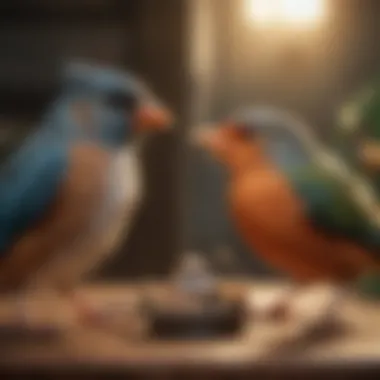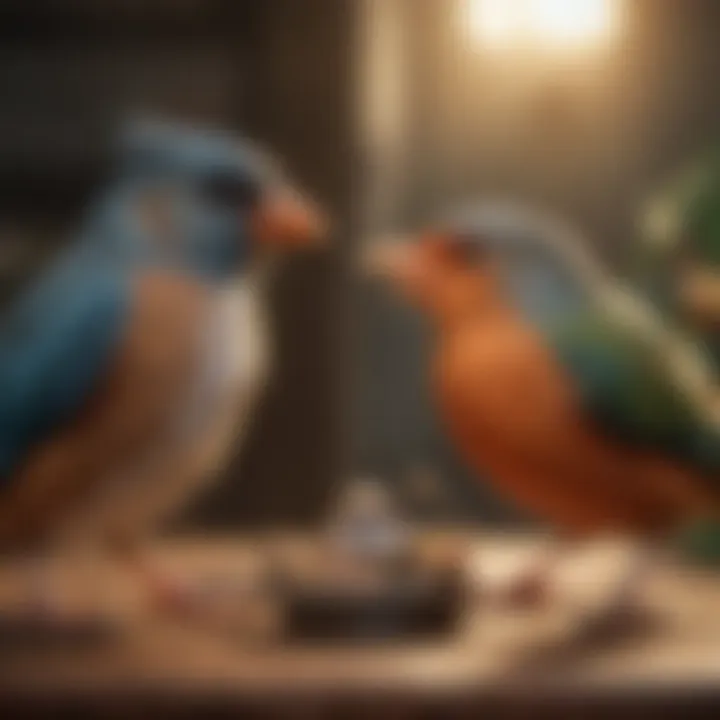Ethical Considerations in Bird Ownership


Intro
Keeping pet birds can stir up a mix of joy, companionship, and sometimes ethical dilemmas. The question of whether it is right to keep these creatures as pets often rests on different perspectives about their welfare, habitats, and emotional well-being. This article takes an in-depth look at various aspects of bird care, examining what it means to be a responsible pet parent while considering the innate needs of these avian companions.
On one hand, many pet bird owners gain immeasurable joy from their feathered friends, enjoying their antics, songs, and personalities. On the other, there's the pressing concern about what it means for a bird to be confined to a human home, distanced from its natural habitat. Are we really prepared for the responsibility it entails? From the basics of avian care to the subtleties of their emotional health, we will explore how to nurture a healthy partnership between humans and birds.
In our journey, we will navigate through several key areas essential for the understanding of bird ethics, touch on bird social behaviors, and dive even deeper into the maintenance of their physical and mental health. Ultimately, our discussion seeks to shed light on the moral implications behind avian care and how to foster a supportive environment.
Let’s embark on this enlightening voyage, starting with the fundamentals of avian care.
Prolusion to Pet Bird Ownership
Keeping pet birds is a journey that many embark on, full of joys and challenges. Understanding the nuances of bird ownership provides a foundation for responsible care and enrichment. As companions, birds offer unique interactions that set them apart from traditional pets like dogs and cats. The distinct vocalizations, vibrant colors, and social behaviors bring a particular charm to households. Yet, with these delightful aspects comes a wave of responsibilities that potential owners must recognize.
Defining Pet Birds
When we mention "pet birds," we look toward avian species that have been domesticated or bred to live alongside humans. Common categories include parrots, canaries, finches, and doves. Each species possesses its own special traits, from the talkative parrot to the melodious canary. Defining these avian companions is not just about identifying their types; it’s also about understanding their unique requirements regarding care, feeding, and social interaction.
Pet birds can be relatively small, like budgerigars, or larger, such as macaws. But regardless of their size, each type deserves specific considerations to ensure their well-being. It's important to note that as we classify these birds as pets, we must also consider their natural behaviors and habitats to support their needs in a home environment.
The Popularity of Birds as Pets
Birds have seen a rise in popularity as household pets for various reasons. A major factor is their generally smaller space requirements compared to dogs or cats. People living in apartments or smaller homes often find birds to be a more manageable choice. This smaller footprint doesn’t compromise the potential for companionship. Many pet owners speak fondly of the joyful company a parakeet or cockatiel can provide.
People also enjoy the beauty and intrigue of watching birds. They bring vibrant colors and lively movements into the home, and many find joy in the delicate sounds they make. Birds are often viewed as little personalities waiting to burst forth, a feature that can be quite captivating. On social platforms like Reddit and Facebook, communities flourish with enthusiasts sharing their day-to-day experiences with pet birds.
However, with this increasing popularity, it’s critical to recognize that owning birds is not simply a matter of adding an exotic pet to the family. This popular perception often overlooks the deeper responsibilities that come along with avian care and the associated ethical questions. Owners must ensure they create and maintain an environment that meets the birds' psychological and physical needs. Understanding why birds have become such cherished companions lays the groundwork for exploring the ethics of their ownership.
Ethics of Animal Ownership
When we talk about having a pet bird, we're not just addressing the companionship or the enjoyment that comes from their presence. Instead, we dive into a realm of moral questions that reflect on our roles as caretakers. The ethics of animal ownership raises critical inquiries about what obligations we have towards these feathered friends. Individuals who choose to keep birds must understand that their responsibilities extend beyond providing food and shelter. They must recognize that each bird is a sentient being capable of experiencing emotions, forming social bonds, and suffering.
The primary elements to consider in this discussion are the concept of sentience and the moral responsibilities of pet owners. Understanding the significance of sentience can change how one perceives pet birds—not as mere ornaments or companions, but as beings with complex needs. With awareness comes an obligation, a sense of duty that every pet owner must embrace in nurturing their birds' well-being. Moreover, it's essential to highlight that neglecting this duty can lead to a plethora of welfare issues, both psychological and physical, for the bird.
Thus, tackling the ethics of animal ownership is not just about feeling good about having pets. It's about fostering a deep understanding of their needs, the societal implications of pet ownership, and actively participating in discussions that promote a more humane treatment of birds in captivity.
The Concept of Sentience in Birds
Sentience in birds refers to their capacity to feel sensations like pleasure, pain, joy, or distress. Recent research shows that birds possess impressive cognitive abilities. For instance, studies demonstrate their ability to solve problems, recognize themselves in mirrors, and even communicate with intricate vocalizations. Such findings call into question how we engage with these creatures. If they can experience the world in such profound ways, it urges us to rethink our actions in relation to their well-being.
Birds express signs of stress or distress in various ways—feathers being plucked, excessive vocalization, or even withdrawal behavior can signal deeper problems. As pet owners, we should not only be observant but proactive in ensuring that their environments are conducive to their emotional health.
In this context, it’s crucial to provide spaces that allow for natural behaviors. Whether that’s perching at different heights or having toys to stimulate engagement, the basic question remains: How can we create an environment that respects their sentience? Recognizing birds as sentient beings is a stepping stone towards offering them a dignified life.
Moral Responsibilities of Pet Owners
Owning a pet bird is indeed a privilege, but it comes with immense responsibility. The moral responsibilities of pet owners encompass several aspects that go beyond the basics of feeding and watering. They include a commitment to understanding and fulfilling the specific needs of the species. For example, different species such as parakeets or cockatiels have varied social and environmental needs.
Here are some of the core elements of moral responsibilities:
- Promoting mental stimulation: Birds are intelligent, often requiring mental challenges. Providing a variety of toys and engaging activities helps prevent boredom and associated behavioral issues.
- Social needs: Birds are inherently social creatures. Ignoring this aspect can lead to loneliness and stress. Owners should ensure that their birds have ample interaction time, whether with their human caretakers or other birds.
- Health care: Regular check-ups with avian veterinarians are essential for monitoring their health. Understanding the typical signs of illness can help in early detection and treatment, a vital ethical responsibility.
- Education: Being a responsible bird owner means dedicating time to learn about your specific bird's needs, behaviors, and the consequences of their captivity. Educating oneself can translate into better care and living conditions.
"The moral compass should guide every pet owner in ensuring their bird leads a happy and healthy life, acknowledging that they play a pivotal role in shaping the experiences of these intelligent beings."
In summary, recognizing the ethics of animal ownership is a multifaceted endeavor. It goes beyond the surface and requires a commitment to understanding and meeting the needs of pet birds. Such awareness not only enriches the lives of the owners but elevates the state of avian care overall.
Welfare Considerations
When considering the ethics of keeping pet birds, one must delve into welfare considerations. This area is paramount because the well-being of these avian companions directly impacts their quality of life. A pet bird isn’t just a pretty ornament; they are sentient beings with unique needs that require thoughtful attention. Addressing welfare means recognizing the responsibility pet owners have to create nurturing environments. The interplay between physical care, psychological enrichment, and social interaction forms the crux of their well-being.
Understanding Basic Needs of Pet Birds
Nutrition


Nutrition stands as the bedrock of any pet bird’s health. A well-balanced diet is not just important; it's vital. Birds have specific dietary needs that vary greatly among species. For instance, while parakeets might benefit from a seed mix enriched with vitamins, an African Grey may thrive on a more varied diet, including fruits and vegetables. The key characteristic of good nutrition for birds is its role in preventing diseases, prolonging life expectancy, and enhancing overall vitality. Without it, even the liveliest bird can exhibit signs of distress or illness.
One unique feature of providing a varied diet is that it stimulates the birds' natural foraging behaviors, encouraging them to engage in more physical activity. However, a disadvantage could be that some pet owners lack knowledge about nutrition, leading to a reliance on commercial feeds that may lack essential nutrients. Thus, the onus is on owners to research and adopt diets that meet their birds’ specific requirements.
Enrichment
Enrichment goes beyond merely providing toys; it taps into the bird’s mental engagement. Birds, being intelligent creatures, need stimulating environments to keep them happy and healthy. The noteworthy aspect of enrichment is that it encourages natural behaviors like foraging, exploring, and problem-solving. It is a beneficial choice for improving mental health and reducing issues such as aggression or feather-plucking.
A unique feature of enrichment activities, such as offering puzzle toys or rotating different objects, is that they prevent boredom. However, there's a fine line as too much, or inappropriate forms of enrichment can lead to stress and anxiety in birds. Hence, while it’s essential for owners to implement enriching activities, they need to observe their birds closely to tailor resources to individual personalities.
Social Interaction
Social interaction is another crucial element of a pet bird's welfare. Birds are inherently social animals that thrive on companionship, so the key characteristc here lies in fostering relationships—whether with humans or conspecifics. Engaging with them daily through communication, play, and routine can significantly enhance their emotional well-being.
A notable feature of social interaction is that it can also mitigate behavioral issues often arising from loneliness. However, if not managed correctly, interactions can become overwhelming, leading to stress or anxiety. It’s important for pet owners to strike a balance, ensuring their birds receive social engagement while also allowing for quiet time. Regular observation can help in understanding the ideal dynamic for each bird.
Assessing Living Conditions
Living conditions can make or break a pet bird's happiness. The environment where they reside must accommodate several factors crucial to their well-being to ensure a quality life.
Cage Size
Cage size is vital for allowing birds adequate space to move around, stretch their wings, and engage in natural behaviors. The key characteristic of a properly sized cage is its dimension relative to the species. Bigger is generally better, but it also depends on the type of bird. For instance, a cockatiel may feel quite cramped in a cage meant for budgies. A larger cage facilitates not just movement but also decreases stress levels, promoting a more content demeanor.
The unique feature here is that a spacious cage can serve as a playground for birds, allowing them to explore within safe limits. However, one disadvantage can be the misconception that bigger cages mean less engagement; it’s essential to fill these spaces with enriching objects and toys to keep birds active.
Environment
The environment where a pet bird lives has a profound impact on its health. An optimal environment considers temperature, humidity, and lighting conditions. The key characteristic of a healthy environment is how closely it mimics a bird’s natural habitat.
For example, African Greys prefer a cooler climate, while cockatiels may enjoy a warmer space. Introducing elements like perches, safe plants, and varied textures can improve their quality of life. However, this responsibility requires ongoing commitment from owners to maintain appropriate living conditions.
Safety Measures
Safety measures represent an often-overlooked aspect of bird welfare. The key emphasis here is to provide an environment that safeguards against hazards such as toxic plants, open windows, or free-flying cats. Regular assessments allow owners to identify potential threats and make necessary modifications.
A unique feature of a safe environment is that it allows birds to explore without fear, enhancing their welfare. However, it demands a diligent approach to ensure that safety measures don’t restrict a bird's exploration and social nature.
To provide the best for your pet bird, prioritize their basic needs and living conditions. Owners should be proactive, observant, and informed to truly cater to their feathered friends.
Species-Specific Ethical Issues
When discussing the ethics of keeping pet birds, it’s crucial to dive into species-specific considerations. This aspect not only highlights the differing needs of various species, but also emphasizes how responsible ownership can vary significantly depending on the bird type. Understanding these differences can lead to better care practices, keeping the welfare of the birds at the forefront.
Common Pet Bird Species and Their Needs
Parakeets
Parakeets, often seen flitting about in pet stores, are one of the most common pet bird species. They bring a vibrant palette of colors and melodies into homes, making them very appealing to many potential owners. A key characteristic of Parakeets is their sociability; they thrive on interaction, whether it’s with their human companions or other birds. This is what makes them a popular choice among pet owners.
However, their needs extend beyond a colorful appearance. One unique feature of Parakeets is their high energy levels. They require ample space to fly and play, as well as toys to keep their minds engaged. Neglecting these aspects could lead to behavioral issues, thus raising ethical concerns about their captivity. Pet owners must be aware of these needs, or they risk compromising the bird’s quality of life.
Cockatiels
Cockatiels are another beloved species, known for their distinctive crests and friendly demeanor. They often bond closely with their owners, showcasing affectionate behaviors that can deeply enrich the experience of bird ownership. Their key characteristic is adaptability, making them suitable for a variety of households.
These birds are unique in their vocal abilities; they can mimic sounds and tunes quite effectively. While this feature may endear them to many, it’s essential for owners to recognize that training and stimulation are necessary. If they are left bored, behavioral problems can arise, which begs the question of whether pet ownership practices are ethical if the bird's needs are not fully met.
African Greys
African Greys stand out in the avian world due to their impressive intelligence and problem-solving skills. Their capacity for mimicry and understanding human speech sets them apart from many other species. This highly intelligent trait makes African Greys a fascinating choice for pet enthusiasts.
However, their intelligence also presents unique challenges. African Greys require mental and physical stimulation tailored to their needs. Without appropriate care, they can develop stress-related behaviors. The need for an enriching environment that allows them to express their natural behaviors is a significant ethical consideration for potential owners. If this isn't provided, it raises further questions about the morality of keeping such intelligent creatures in captivity.
Challenges with Exotic Birds


Conservation Status
The conservation status of exotic birds poses ethical questions regarding their keeping as pets. Many exotic species are threatened due to habitat loss and illegal wildlife trade. Keeping such birds raises the issue of whether it contributes to or detracts from conservation efforts. It’s essential to consider the sourcing of these birds. When proper conservation practices are adhered to, limited breeding in captivity can aid in the preservation of some species. However, unethical breeding can worsen the plight of already endangered birds, making it a complex ethical dilemma.
Captive Breeding Concerns
Captive breeding itself raises multiple ethical concerns. While breeders often promote their practices as conservation-oriented, the reality can vary significantly. It's vital to assess whether the breeding programs adhere to responsible and humane standards. The unique challenges include genetic diversity, the mental well-being of the birds, and the long-term sustainability of the captive population.
Therefore, scrutinizing these breeding practices and questioning their motivations is key for potential owners. If the breeding is not managed ethically, it could lead to more harm than good, contradicting the very principles of responsible bird ownership.
In understanding these species-specific ethical issues, we can foster a deeper respect for not just the needs of the birds, but also the responsibilities that come with their care.
Legal and Ethical Frameworks
The landscape of keeping pet birds is not just about feeding them and offering a cozy space to nest. It's rooted deeply in legal obligations and ethical considerations that can shape how we approach avian companionship. Understanding these frameworks helps bridge the gap between animal welfare and human responsibility, making us more aware of the implications of our choices. As pet owners, we are stewards of these delicate lives and, with that, comes a significant weight of moral and legal responsibilities.
Navigating these frameworks is essential in ensuring that our feathered friends are kept in environments that respect their natural behaviors and needs. Knowing the legalities surrounding pet bird ownership is one piece of a larger puzzle that contributes to a holistic understanding of ethics in avian care.
Regulations Governing Pet Bird Ownership
Licensing
Licensing serves as a critical element in regulating pet bird ownership. It sets forth guidelines that aim to ensure that only responsible individuals can own these animals. This verification process represents a first step towards protecting both the rights of the pet birds and the broader ecosystem.
One key characteristic of licensing is that it often requires potential owners to demonstrate a level of knowledge about bird care, which can lead to better informed pet parents. This typically includes understanding a bird's dietary needs, social behaviors, and proper housing. Such education can shift the responsibility from mere ownership to genuine caretaking. A unique feature of licensing is its capability to create barriers against impulsive decisions, ensuring that prospective owners are properly vetted. However, one downside might be that it can also deter would-be bird parents who may feel overwhelmed by the process.
Trade Regulations
Trade regulations focus on the legal aspects of buying, selling, and breeding birds, with the aim of preventing the exploitation of endangered species and promoting ethical practices. The regulation of avian sales involves documentation requirements, which makes it harder for illegal or unethical trade to flourish.
This aspect is crucial since many pet birds come from wild populations that are at risk due to habitat loss and illegal trapping. A notable characteristic of trade regulations is the enforcement of permits, which can limit how many birds are traded and under what circumstances. These measures can encourage responsible breeding, but a downside is that excessive regulation might lead to scarcity, driving potential owners toward unregulated sellers.
Non-Governmental Organizations and Their Role
Advocacy Efforts
The role of non-governmental organizations in bird ownership is pivotal in shaping ethical norms and establishing standards within the community. Advocacy efforts focus on raising public awareness regarding the needs and welfare of pet birds, pushing for humane practices that reflect an understanding of avian behavior.
One of the standout characteristics of these efforts is their grassroots approach, engaging communities in discourse about what's best for pet birds. By organizing campaigns and workshops, these organizations inspire a culture of empathy and responsibility among bird owners. However, there can be a criticism that some advocacy approaches may lack scientific backing, relying instead on emotional appeals, which can alienate those who seek factual information.
Education Initiatives
Education initiatives are another cornerstone provided by these organizations, aiming to equip current and future pet owners with essential knowledge. They often produce valuable resources and conduct workshops that promote best practices in avian care.
A key characteristic of these initiatives is their ability to make complex information accessible to a broad audience, including first-time bird parents. They often address topics from basic care to complex behavioral issues, reflecting the diversity within the avian community. However, a potential disadvantage is that the availability of resources can vary, leading to disparities in knowledge depending on geographic location or socioeconomic status.
"Being informed is the first step towards strong ethical practices in bird ownership. Knowledge is power."
The Impact of Domestication
Understanding the impact of domestication on pet birds is pivotal in grasping their overall welfare and behavior in captivity. Domestication is not just a simple twist of fate; it’s a deeply rooted process that transforms wild creatures into companions. These changes often come with both boons and banes, demanding a closer look at how they affect our feathered friends in domestic environments.
Changes in Behavior Due to Domestication
When we think about domestication, the first thing that often springs to mind is how behaviors shift in response to living alongside humans. For pet birds, like parakeets or canaries, the transition from wild to tame radically alters not just their environments, but their very instincts.
- Socialization: Birds that are domesticated often become more extroverted. Unlike their wild cousins who might avoid human interactions, domesticated birds may seek them out. For instance, while a wild cockatiel may fly away from a human, its pet counterpart often delights in social engagement.
- Vocalization: Many pet bird species develop increased vocal skills through interaction. A cockatoo, for example, may learn to mimic not just sounds but also phrases from its human companions. This ability isn’t typically seen in the wild, where communication serves different purposes such as warnings or signals.
- Dependency: On the flip side, domestication can lead to heightened dependency on their owners for care, safety, and even social interaction. This dependency can result in anxiety when left alone. Birds like African Grey Parrots may develop separation anxiety, a notable change from their wild behavior where they needed to fend for themselves.
"Understanding the behavioral shifts brought on by domestication sheds light on the needs of pet birds, guiding owners on creating an enriching environment."
Implications for Bird Welfare
The profound implications of domestication on bird welfare cannot be overlooked. While birds often adapt to their new lives, the cost can be significant if their specific needs are not met.
- Mental Health: Domesticated birds may experience boredom or stress if their environment lacks stimulation. Providing toys, opportunities for exploration, and social interaction can help mitigate these issues.
- Physical Well-being: The transformation can also lead to changes in physical health. Birds may become less active, garnering weight if they are in a confinement too small or if their setup doesn’t encourage movement. A spacious cage allows enough room for flight which is crucial.
- Continued Care: Finally, the ongoing responsibility of caring for a domesticated bird is immense. Owners must stay educated about the evolving ethical considerations when choosing a species. Understanding the innate behaviors and habitat requirements helps in striking the right balance between ownership and welfare.


Therefore, as we delve deeper into the impact of domestication, it becomes clear that recognizing and accommodating these changes is crucial for fostering a compassionate and healthy relationship between pet birds and their owners.
Educating Pet Owners
Educating pet owners about the responsibilities that come with keeping birds is fundamental to ensuring the well-being of these creatures. The knowledge or lack thereof can dramatically impact a bird's quality of life. It’s crucial for potential bird owners to understand that birds are not just simple pets; they are complex beings with specific needs that must be met to thrive.
Having a well-educated owner can mean the difference between a healthy, happy bird and one that suffers from neglect or improper care. Familiarity with the basics of avian behavior, nutritional requirements, and environmental needs sets the stage for a fulfilling pet-owner relationship.
Best Practices for Care
Quality care for pet birds involves several aspects that cannot be overlooked. Owners need to embrace a holistic approach that targets physical, mental, and emotional health. Some best practices include:
- Proper Nutrition: A bird's diet should mimic the diversity found in the wild, incorporating seeds, fruits, and specially formulated pellets. Each species has unique dietary needs. For instance, parakeets thrive on a variety of seeds, while African Greys benefit from a balanced mix of fruits and veggies.
- Enrichment Activities: Birds are natural explorers. Providing toys, social interaction, and opportunities for climbing and foraging can prevent boredom. Interactive games can stimulate their minds, reduce stress, and enhance their overall experience.
- Social Interaction: Birds are social animals. Daily interaction with their human family or other birds is essential. This can foster emotional health and establish a strong bond between the bird and owner, making both parties happier.
- Routine Vet Check-ups: Regular veterinary visits are necessary to monitor the bird’s health and catch any potential issues before they become serious. Finding an avian specialist ensures that your feathered friend receives the most appropriate care.
Incorporating these practices allows owners to provide their birds with a thriving environment. Failure to do so can lead to negative outcomes both physically and psychologically.
Understanding the Bird's Perspective
A pet bird's perspective is unique, and understanding it is pivotal for effective care. Birds don't view their world like humans do. They experience stress and fear differently and are easily influenced by their surroundings and how they are treated.
Birds are prey animals. They react instinctively to perceived threats, which means that loud noises or sudden movements can lead to anxiety. An owner who respects and accommodates these sensitivities will likely see more confident and interactive behavior in their bird.
Additionally, knowing how to interpret a bird's body language can profoundly enhance the owner’s ability to engage effectively with their pet. Indicators such as tail feathers standing upright signal happiness, while ruffled feathers may indicate fear or discomfort.
Engaging deeply with a bird's perspective helps owners not only to nurture but to anticipate needs and feelings, resulting in a much more cohesive relationship. This knowledge lays the groundwork for a more rewarding companionship.
"Understanding your pet's needs is not just a matter of care; it's creating a mutual bond based on empathy and respect."
In summary, educating pet owners is a critical aspect of ethical bird keeping. By implementing best practices for care and gaining insights into how birds perceive their environment, owners can foster an enriching atmosphere that benefits both parties. This commitment ensures a more humane approach to pet ownership, ultimately uplifting the standards of avian care.
Debates in Bird Ownership
When it comes to owning pet birds, the discussions can get quite heated. This section dives into both sides of the coin, exploring the arguments for and against keeping birds as companions. Understanding these debates isn't just a matter of preference; it sheds light on ethics, responsibility, and the essence of what it means to truly care for another living being.
The importance of debating the merits of bird ownership lies in understanding the implications involved in bringing a bird into your home. From their specialized needs to the complexities of their care, pet birds evoke varying opinions. Thus, considering different perspectives allows potential owners to make informed decisions about their commitment.
Arguments for Keeping Birds as Pets
Supporters of pet bird ownership often point to a few compelling arguments:
- Enrichment and Interaction: Many birds, such as budgerigars and cockatiels, are known for their sociable nature. They can form strong bonds with their human guardians, creating a dynamic relationship that can be immensely rewarding. Their playful antics and vocalizations often bring joy to the household, enriching the lives of their owners.
- Lifelong Companionship: Birds, particularly larger species like African Greys or Amazon parrots, can live for decades. This longevity offers a unique opportunity for multi-generational companionship, where families can build connections that last a lifetime.
- Low Space Requirements: For those living in smaller spaces, birds can be an ideal pet. They generally require less physical space than dogs or cats, making them suitable for apartment living. A well-sized cage can provide a safe environment, and most birds can enjoy interaction outside of their cages as well.
- Educational Experience: Owning a pet bird can also be an educational venture. It encourages a better understanding of animal behavior, biology, and ecology, and often instills a deeper appreciation for wildlife and conservation issues.
Arguments Against Keeping Birds as Pets
On the flip side, several concerns arise when discussing the ethics of bird ownership:
- Social Needs: Birds are inherently social creatures. Keeping them in isolation can lead to behavioral issues, such as feather plucking or excessive vocalization. It's vital to recognize the need for companionship, not just from humans but sometimes from other birds as well.
- Captivity Challenges: Many species experience a loss of natural behaviors in captivity. For instance, birds accustomed to flight in the wild might exhibit signs of frustration when restricted to a cage. This raises ethical questions about whether it's fair to keep such creatures in confined spaces.
- Lifespan Implications: While the lifetime companionship can be a positive, it can also be daunting. Potential owners need to consider the long-term commitment involved and the emotional toll of potentially outliving their pets.
- Conservation and Ethical Sourcing: The demand for exotic birds in the pet trade can contribute to sustainability issues and habitat destruction. Opting for captive-bred birds rather than wild-caught varieties is crucial, but even then, buyers must scrutinize sources and be mindful of the conservation status of species.
Ultimately, the debate around bird ownership is complex, balancing joy and companionship with ethical, environmental, and social considerations.
End
The conclusion of this article holds a significant place in the dialogue about pet bird ownership. It serves not only as a recap of the main ethical discussions presented throughout the text but also as a critical moment for reflection on the responsibilities that accompany avian companionship. As the curtain falls on this exploration, the aim is to leave readers with a clear understanding of the multifaceted nature of bird ownership and the ethical dilemmas intertwined with it.
Summary of Key Ethical Considerations
In the earlier sections, several ethical dimensions were outlined. For starters, the concept of sentience within avian species was emphasized. Birds, along with their distinct personalities and emotional capacities, require a level of care that respects their inherent needs. This means that pet owners must grapple with their duty to ensure proper nutrition, socialization, and environmental enrichment.
The call for a well-tailored living situation, considering cage size and safety, boils down to the notion that every bird deserves to thrive in an environment that mimics its natural habitat as closely as possible. Moreover, issues surrounding conservation—especially when dealing with exotic birds—underline the moral obligations we share as caretakers. Understanding these elements enhances not only the well-being of our feathered friends but also fosters a deeper bond between bird and owner.
"Ethics is knowing the difference between what you have a right to do and what is right to do."
— Potter Stewart
Future Directions in Avian Care Ethics
Looking ahead, the conversation about the ethics surrounding keeping pet birds is far from stagnant. There is a burgeoning movement advocating for better regulations and a more educated approach to bird care. Emerging research into bird behavior, welfare, and conservation issues will undoubtedly influence how society perceives and treats avian pets.
Pet owners will need to adapt their practices in response to ongoing findings. This includes:
- Emphasizing species-specific care by understanding the unique requirements of different breeds.
- Advocating for ethical breeding practices to prevent the overpopulation of pet birds.
- Promoting sustainable pet ownership, aligned with conservation efforts that respect avian habitats.
As pet bird ownership continues to evolve, the voices of organizations and passionate individuals fighting for avian rights must resonate more strongly. An informed community can cultivate an environment where pet birds can flourish while simultaneously enriching the lives of those who choose to share their homes with these remarkable creatures.















